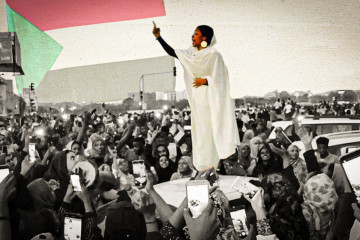
'Rape will not stop us': In Sudan, sexual violence is a weapon against women's resistance

Since last October, the streets of Sudan have been filled with anger, resistance, and exhilaration as hundreds of thousands of people across the country continue to protest against the military takeover and demand civilian rule.
On December 19th, as crowds chanted for freedom and sang revolutionary songs commemorating the 18 December revolution, reports began to emerge that regime-backed military and security forces had carried out organised mass rape and sexual assault attacks against at least 13 female protestors at the demonstrations.
Since then, more reports have emerged of sexual violence being used as a weapon by state forces in a targeted campaign against female protesters. This month, security forces allegedly gang-raped an 18-year old after she was stopped on her way home after asking if she had participated in the day’s demonstrations.
In Sudan, as is the case across the region, gender-based violence and discrimination are an everyday reality for women. But in the context of political upheaval, such as a revolution or a military coup, sexual violence often becomes much more aggressive and systematic, leaving women in particularly vulnerable positions.
"In the context of political upheaval, such as a revolution or a military coup, sexual violence often becomes much more aggressive and systematic, leaving women in particularly vulnerable positions"
The recent coup and ensuing uprisings have created conditions that are ripe for sexual violence, explained Sulaima Ishaq El-Khalifa, the head of Sudan’s governmental unit for combatting gender-based violence.
“Since the 25th of October, the rule of law has broken down, there is a lack of institutional responsibility, and there is no state…Whenever there is political violence in Sudan, women and girls will be affected and attacked,” El-Khalifa said.
In response, El-Khalifa and her team established anonymous hotlines and made public announcements to reach out to victims of sexual violence. She says that the most important immediate consideration is providing the necessary medical attention to prevent long-term health consequences, such as medication needed to prevent pregnancy and sexually transmitted infections.
However, because of the social stigma associated with sexual assault, many women never report their assaults or seek medical care afterwards. “We are a rape culture. People always blame the victim rather than criminalising the criminal” El-Khalifa said.
|
|
It’s therefore likely that the number of women who were assaulted is far higher than official numbers, concealing the scale and systematic nature of the issue.
Previous political uprisings in Sudan have seen similar patterns of violence against women, intended to punish those who take part.
“We expect this. In Sudan we have a history of using sexual violence as a tool of war and political violence…Security forces use sexual violence regularly with both women and men, so it was not a surprise,” El-Khalifa said.
Recent reports of sexual violence and aggressive behaviours by security forces were reminiscent of the Khartoum Massacre of 2019, where members of the notorious paramilitary Rapid Support Forces brutally dispersed a sit-in demonstration, killing over 100 demonstrators and raping dozens of women and men.
El-Khalifa, who was there providing psychological and social support for the women and girls affected by gender-based violence, said that current events feel like she’s reliving a nightmare.
“In Sudan, we have not yet healed from what happened on the 3rd of June, and now with this coup it feels like we are back to level zero where women and girls can be targeted all the time.”
The weaponisation of sexual violence is by no means a culturally specific phenomenon, and has become characteristic of conflict and protest movements across the world. In the region, the use of sexual violence in protests was also prevalent during the Egyptian revolution of 2011, where violence against women was used to try and break the women on the frontlines.
“During the protests, you could see women using their bodies in extremely powerful ways, shaking their fists at police men, going face to face with army generals, women were out there using their bodies to resist,” said Sherine Hafez, professor of gender and sexuality studies at University of California, Riverside and author of Women of the Midan: The Untold Stories of Egypt’s Revolutionaries.
Hafez explained that, in patriarchal societies where women’s political participation is condemned, their heightened visibility during uprisings is deemed unacceptable, and sexual violence becomes a weapon systematically wielded to deter their participation in revolution, quelling their resistance.
"The ultimate goal becomes to disempower and defeat the revolutionary movement through the conquering of women’s bodies"
“This kind of violence against women is meant to repress their presence in the public sphere, not just their political presence but their presence altogether,” Hafez explained.
“In places like Egypt and Sudan, politics is seen as a space for men. When women are present in these large numbers in these masculine spaces …their presence is so offensive to some who respond with violence to prevent it from happening. That's why their presence elicits such aggressive reactions,” she continued.
In a context such as this, where women’s presence in the public sphere becomes irreconcilable to the powers that be, Hafez argues that women’s bodies become sites of resistance themselves. The ultimate goal becomes to disempower and defeat the revolutionary movement through the conquering of women’s bodies.
The use of sexual violence is a powerful threat, and both El-Khalifa and Hafez note that many of the Sudanese and Egyptian women they spoke with described the fear and the anxiety that gripped their bodies before they went out to protest, and how it made them hesitant to join the masses.
This fear and internalised repression intended to disempower women is meant to scare them into retreating and drive them away from protests. But in Sudan, women continue to take to the streets in defiance, even organising their own marches against sexual violence and in support of survivors.
On December 23, the streets of Khartoum were filled with women chanting ‘rape will not stop us’.
“Women and girls in Sudan know very much how much risk they are enduring and how much they could go through, but it does not defeat their capacity to resist and to fight for democratic transitions,” said El-Khalifa.
In fact, while sexual violence is a visceral and ominous reminder of what women risk by joining protests, it also serves as a reminder of what they are fighting for.
El-Khalifa believes that the fight for freedom and democracy is deeply intertwined with the fight for women’s rights and liberation, and sees her work in protection and prevention and advocating for women’s rights as deeply political, not just humanitarian.
"Today, despite the centrality of women in resistance movements, from Egypt to Sudan, women’s rights and gender equality are often sidelined in the formal political processes that take place in the aftermath of revolution"
“If you talk about changing the situation for women you are talking about changing policies - it's a radical transformation within the political arena. Women’s protection is the key for more political, economic, and social participation of women.”
Today, despite the centrality of women in resistance movements, from Egypt to Sudan, women’s rights and gender equality are often sidelined in the formal political processes that take place in the aftermath of revolution.
Still, Hafez believes that there is much to be celebrated. “In Egypt, the revolution succeeded in reshaping how we think about protest and women’s political participation… They lay down a claim on the physical and political space that cannot be forgotten.”
Much of today’s activism around women’s rights and gender equality in both countries has been invigorated by past and present political uprisings and continues to challenge the patriarchal structures that oppress women and demand accountability.
El-Khalifa agrees that the future is hopeful. “It's the time for women now.”
Nadine Talaat is a London-based journalist writing about Middle East politics, US foreign policy, and media studies. She is also part of The New Arab's editorial team.
Follow her on Twitter: @nadine_talaat
![Sudanese women chant slogans during a rally on April 13, 2019. Despite the threat of sexual violence, Sudanese women have been at the frontlines of the country's many uprisings. [Getty]](/sites/default/files/styles/large_16_9/public/1136489049.jpeg?h=594644ef&itok=YInl0FdX)
![Palestinians mourned the victims of an Israeli strike on Deir al-Balah [Getty]](/sites/default/files/styles/image_684x385/public/2024-11/GettyImages-2182362043.jpg?h=199d8c1f&itok=xSHZFbmc)


![The law could be enforced against teachers without prior notice [Getty]](/sites/default/files/styles/image_684x385/public/2178740715.jpeg?h=a5f2f23a&itok=hnqrCS4x)
 Follow the Middle East's top stories in English at The New Arab on Google News
Follow the Middle East's top stories in English at The New Arab on Google News


